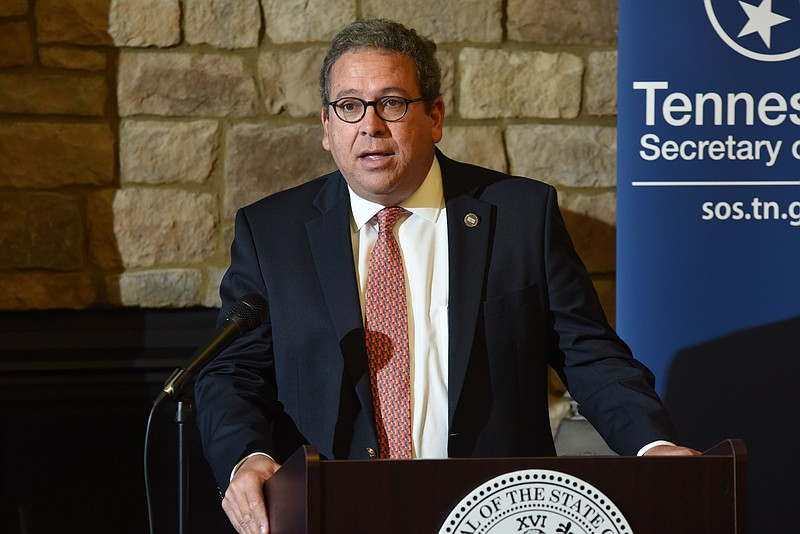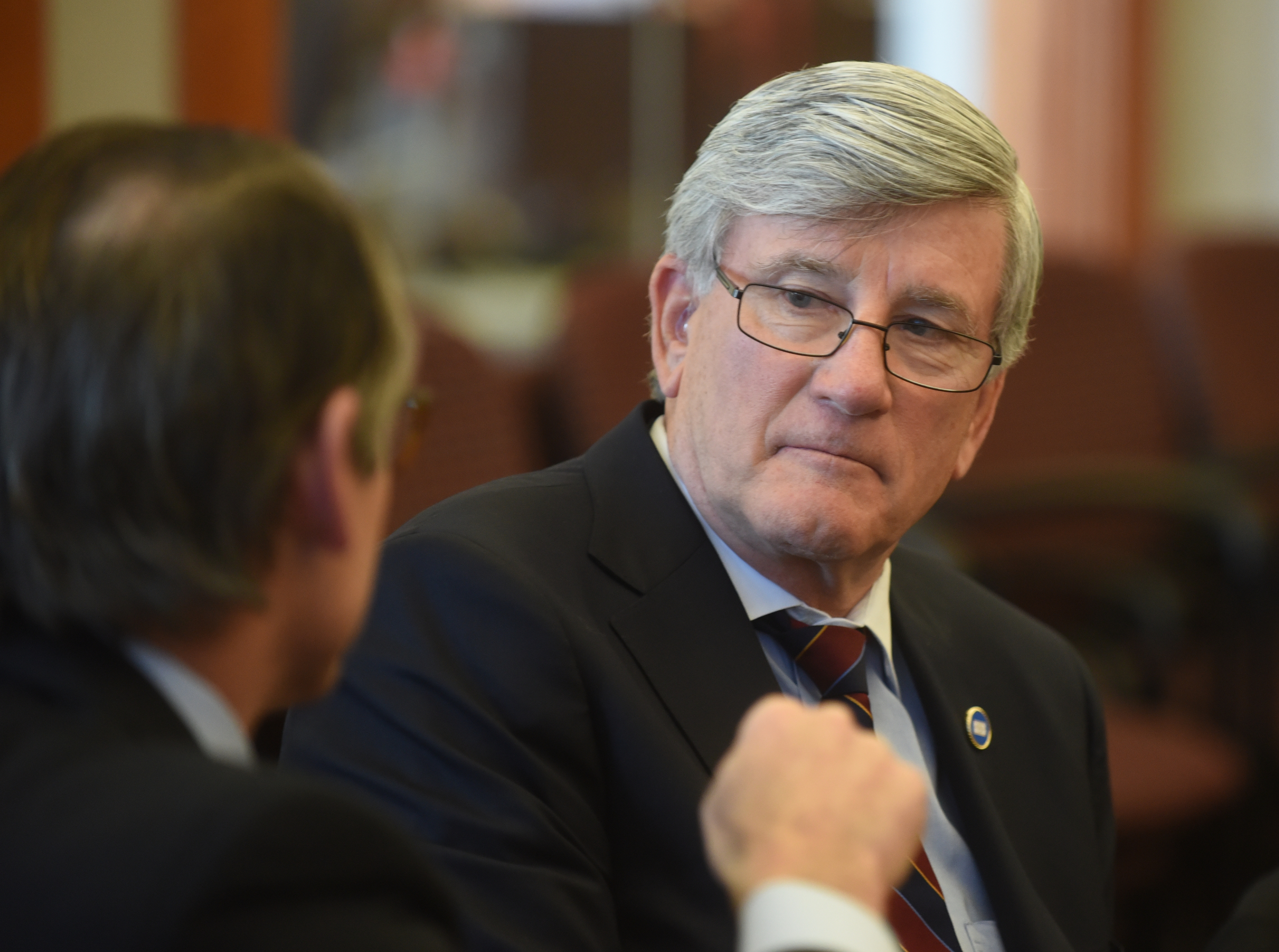NASHVILLE - If Chattanooga Lookouts team owners decide to seek public tax support for a new baseball stadium in the city's South Broad Street district, they could find their path narrowed considerably under proposed legislation introduced in the Tennessee General Assembly by two local lawmakers.
Sen. Todd Gardenhire and Rep. Gerald McCormick, both Chattanooga Republicans, are sponsoring two bills, one of which would require Tennessee cities and counties to hold non-binding public referendum votes before officials could use a portion of property tax and sales tax proceeds toward retiring debt on a sports facility with a professional sports franchise as a tenant.
The second bill, meanwhile, adds new language to existing law regarding industrial development corporations, spelling out with more specificity the types of infrastructure projects that can be carried out by these local government-created nonprofit groups often relied upon for economic development projects.
The bill authorizes taxpayer support in areas like sewer, utilities, roads and power lines. Nothing is included about constructing sports stadiums or ball parks and that was deliberate, Gardenhire and McCormick said in interviews last week.
Both lawmakers emphasized their legislation has statewide impact and isn't intended to single out Chattanooga where there has been an ongoing public "visioning" process to develop recommendations regarding future redevelopment of a 10-square-block area in the South Broad Street district.
Discussions have included relocating the Chattanooga Lookouts minor league baseball team from its current site at AT&T Field near the Olgiati Bridge to a 141-acre South Broad Street site that includes the defunct Wheland and U.S. Pipe factories.
The bills, Gardenhire said, would apply "to any proposed project, not specific to picking on that one [South Broad] but any proposed project whether it's here, or Nashville or Memphis or Knoxville where they want to use taxpayers' money for a stadium."
Holding a non-binding referendum "would let elected officials know whether there's really public support for it and not just a few people," Gardenhire added. "And then if they [elected officials] want to vote for it, that's fine. They can see where the support really is."
Last August, the Beacon Center, a Nashville-based free market think tank which opposes using tax dollars for projects involving professional sports teams, called for a public referendum in Chattanooga if final plans for the South Broad Street site call for using tax support to construct a new Lookouts stadium.
Regarding the infrastructure bill, McCormick said current state law doesn't adequately lay out what's acceptable and what's not in terms of public spending on local infrastructure projects.
"Something that's going to produce a profit, basically that's not infrastructure," McCormick said. "If it's a sewer line, that's infrastructure."
The bills' overall intent, he said, "is to have some oversight and some discussion before we turn over millions of dollars to millionaires to build ball stadiums."
The entire area South Broad Street district that local officials, property owners and others are discussing involves 400 or more acres. It includes the 141-acre site owned by Perimeter Properties on which the old Wheland Foundry and U.S. Pipe foundries are located.
That site is being eyed for a mix of entertainment, residential and retail activity. The Chattanooga Design Studio, a nonprofit overseeing the visioning process for the entire area, has held two public meetings.
It's preparing to issue its recommendations in early 2018, said Eric Myers, the Design Studio's executive director.
Owners of the Chattanooga Lookouts, a minor league baseball team, have publicly shown interest in building a new stadium there with the current site being some 18 years old. And at least one of Perimeter's partners has publicly shown interest in having the team relocate to the site.
Lookouts operating partner Jason Freier said last week the ownership group is waiting for the Design Center's recommendations before deciding its course of action.
"Once there's a plan or at least some suggestions on the table we would probably get engaged and have discussions if the plan indicated that a new outdoor venue would be an appropriate part of that plan," Freier said. "We're certainly waiting for the final recommendations to come out before engaging in that in a meaningful way."
Last August, Freier told the Times Free Press the foundry site, coupled with other investments, could be "a game-changer" for that part of the city. He said they'd also discussed with the foundry site owners how new minor league ballparks for other teams they own in Fort Wayne, Ind., and Columbia, S.C., have been catalysts for growth.
In each instance, he said at the time, "large, complicated public-private partnerships" were used to develop the projects.
Freier said last week that Lookouts owners haven't gotten to the point of eyeing the Chattanooga Industrial Development Board for assistance in a joint public-private partnership on funding.
"We're not far enough down the road that I know anything about that second piece of legislation or how it could impact anything," Freier said last week.
But he's no fan of the referendum bill whether it's binding or non-binding.
"I've seen it in a dozen other cities, it has always been something proposed by people who are against the project," Freier said. "It is often, as is in the situation there, I know there's some group in Nashville that was calling for a referendum, there was mention of a potential project in any newspaper, they're always on record on being against a deal that has absolutely no structure or details to it yet."
Complex proposals can be portrayed misleadingly to the public, he said.
Freier said "deals like this can be good deals or bad deals, just like any other investment whether it's a business or a city or a municipality. It's all about what the actual structure of the transaction is, what each side is committing to do and that sort of thing."
Alluding to the Beacon Center, Freier said "we always understand that when people come out against something before there are any details about or any information about it, that tells us they're not actually trying to evaluate whether or not a particular thing makes sense, they just have some sort of agenda that they're pushing."
Chattanooga Mayor Andy Berke was unavailable for comment Friday with a spokesman saying the mayor was vacationing out of town with his family.
Justin Owen, the Beacon Center's CEO, and supporters recently created a new nonprofit called Beacon Impact, which is the think tank's advocacy partner and has greater flexibility to engage in lobbying and political issues.
Owen, who is also Beacon Impact's CEO, said the Impact group's take on the Gardenhire-McCormick referendum bill is that "obviously we would prefer it to be binding."
Still, Owen said, "at the very least you're giving voters a voice in the process. This lets politicians know where voters stand" when it comes to putting "precious taxpayer resources into those things against the wishes of the taxpayers."
Public-private partnerships have been used in the past in various areas of Tennessee to lure professional sports teams, the luring of the then-Houston Oilers NFL franchise to Nashville in the mid-1990s being a major example. State and local resources went into the deal and Nashville now has the Tennessee Titans and a stadium across the Cumberland River from downtown.
Nashville has since gained a NHL franchise, the Nashville Predators. And now it's been chosen for a Major League Soccer franchise expansion.
According to the Tennessean newspaper, Nashville Mayor Megan Barry has proposed an estimated $250 million, 27,500-seat stadium project. Metro would issue some $225 million in revenue bonds to pay most of the construction costs and a private ownership group led by Tennessee businessman John Ingram would deal with the majority of the city's debt.
Metro Nashville would borrow another $25 million through general obligation bonds for infrastructure improvements to the Nashville-owned fairgrounds where the stadium will be located.
Beacon Impact's Owen said he doesn't think the Gardenhire-McCormick bill would force Nashville to hold a non-binding referendum, saying Metro officials "rammed that thing through so fast" it is likely a done deal before any legislative bill could pass.
The bill would become law upon passage, according to its enacting clause.
Contact Andy Sher at asher@timesfreepress.com or 615-255-0550. Follow on Twitter @AndySher1.

